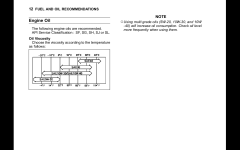rickss69. I didn't read anywhere close to all 80 billion words in the link you sent. It seems to focus mostly on watercooled engines. There is mention that air cooled engines run hotter and should run Xw50 or Xw60 weight oils. My take-away is that the point of the blog is to say the need for high zinc oil is a hoax.
80 billion words do not change the fact that, Kawasaki, a leading manufacturer of air-cooled engines, sells a wide range of high zinc oils and recommends them for their engines.
As for the blog's accusation referring to zinc oil users: "Only stupid people keep doing the same thing over and over again, while expecting different results" I personally keep using the same high zinc oil over and over again, as recommended by the manufacturer, expecting the same fantastic results.
If what you are doing is working for you, and you take responsibility for the results, then great. Where I have a problem is when people ignore the manufacturer's recommendations because they know better from some guy's blog, and then they come whining to the manufacturer wanting warranty coverage when they didn't follow directions.
Yes, it was ZDDP or zinc I was referring to in my previous post. The blog is not so much focused on any particular component used in oils, but rather a method to initially make a informed decision on what to consider/purchase. I agree the blog is daunting to navigate, but it is a running thing that has evolved over 15 years at least.
The ZDDP component seems to be the most misunderstood and highly debated topic when it comes to oil discussions so I will stick with that for right now. Many like to think of ZDDP coating surfaces and offering protection in that form. It simply does not work in that fashion. Nobody has ever pulled a part out of any engine and noticed a ZDDP "sweater" so to speak on said part. ZDDP requires intense heat and pressure to even activate the compound(s) (yes, there are more than one type used). If ZDDP was a constant use component one would see a drastic depletion rate over the lifespan of any given oil. The fact is you can view hundreds if not thousands of used oil samples of any engine configuration you choose and you will find the depletion rates are miniscule at best. Yes, I have spent hours doing just that to satisfy my own curiosity.
The timeline of ZDDP is rather well documented and abbreviated here is what we find - In the 1950's nearly all oils had a 300ppm content of ZDDP. The decade of the 1960's saw a increase to 800ppm ZDDP (note this decade saw some of the highest performance vehicles ever produced). In 1970 some oil manufacturers tried and failed with 1000+ppm levels of ZDDP. It was a short lived experiment to see if they could extend the useful lifespan of oil due to the known fact that many consumers simply did not adhere to regular and timely oil changes. Moving forward to present day the ppm levels are once again back to where they were in the 1960's...800ppm for the bulk of oil sold/used by consumers. Many still believe that the advent of catalytic convertors saw oil manufacturers remove ZDDP completely from all oils...not true. Fact is you would be hard pressed to find any oil without ZDDP.
Yes, I understand we are talking about air cooled engines here for the most part. For the most part oil does not know the difference between water or air cooling as long as you are using the appropriate viscosity for either engine which by the way has little or nothing to do with oil temperatures. Just simply using a higher viscosity oil accomplishes nothing as far as temperatures go and can have the effect of actually raising temperatures in some cases. Yes, I understand we are discussing engines with splash oiling only for the most part, but the principal remains the same. I think the only way one could actually choose any particular viscosity oil for a given air cooled engine is to know what the highest oil temperatures will be experienced. Does anyone here have any data on recorded oil temps in their equipment? I do know that elevated oil temps will thin even high viscosity oils and suspect that is the reason for their use. I have no data for air cooled engines myself, but knowing how most oils perform I would say sustained oil temps over 250 degrees would warrant very short oil change intervals regardless of viscosity.


